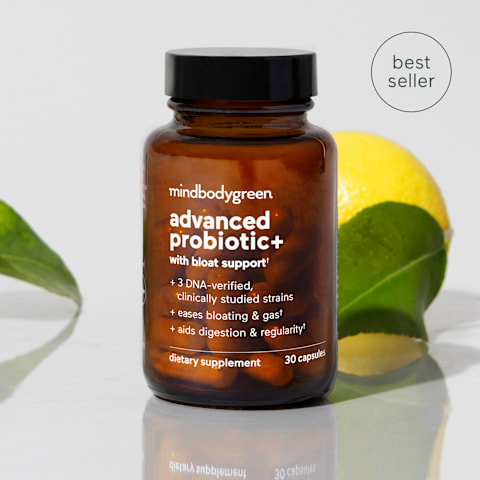Advertisement
11 RD-Approved Tricks To Get Rid Of Bloat


Nobody likes being bloated. The rock in your belly, the pants that need to be unbuttoned, like, five minutes ago. Luckily, there are a few tips that help get rid of bloat once you have it—and prevent it from ever happening again. Read on for 11 science-backed tricks for soothing the stomach, using things you likely have in your pantry.
1. Skip the salt
The sky-high sodium in salty foods can cause dehydration, which contributes to bloating. Some foods to avoid are cured meat, canned and frozen foods, most processed snacks, and sauces and condiments like soy sauce, marinara, mustard, and the like. Bread can be another sneaky source.
At home, cook with herbs and spices instead of salt. If you’re out, then ask for condiments to come on the side and use a light touch when applying—or scrape off some excess if "on the side" isn’t an option. One of my favorite healthy hacks: Swap in oil and vinegar for salad dressing so you get some flavor and heart-healthy fats without any of the "what the heck is that?" from bottled dressings.
2. Try probiotics
Probiotic bacteria found in fermented foods like yogurt and kefir promote good digestion and fight swelling and bloat. I often recommend kefir because it’s almost lactose-free, making it easier to digest if you’re sensitive to dairy. Just stick with plain to sidestep sugar and artificial sweeteners.
Not into kefir? Then consider a probiotic supplement with multiple types of bacteria in it to get the same benefits. Each bacterial strain does slightly different things, so you’ll cover multiple bases rather than if you were to stick with straight-up acidophilus, lactobacillus, etc.
3. Slow down
Eating too fast causes gas to build up in the stomach. Put your fork down between bites to pace yourself. Added bonus: This also helps your brain and body catch up with each other so you know when you’re satisfied.
4. Stick to water
Skip the bubbles and booze—at least in the short term. It may sound counterintuitive, but staying hydrated discourages water retention because your body isn’t struggling to hold on to the water it has. Because alcohol can be dehydrating (and contribute excess calories), it can make you feel bloated. Drinking carbonated beverages can also lead to a buildup of gas and make you feel puffy, so take a break from seltzer and other fizzy drinks.
5. Try coffee (or tea)
The caffeine in coffee and tea has a diuretic effect, meaning it’ll make you pee more. Tea1 and coffee have also been shown to have powerful anti-inflammatory effects2 when part of a regular diet, which can have long-term benefits to your digestive health. A cup or two a day is great, but don’t overdo it—unless, of course, you like caffeine jitters or diarrhea.
6. Limit hard-to-digest foods
Cruciferous veggies like broccoli, cauliflower, kale, and Brussels sprouts are packed with nutrients, although the body has to work hard to digest them, which can lead to gas and bloating as they ferment in the digestive tract. Keeping them off the menu for a few days can help if you’re looking to de-bloat for an event.
A few others on this list: beans, lentils, whole grains, and dairy (if you’re lactose intolerant). Artificial sweeteners also get kicked off the island because they can cause bloat-inducing stomach woes.
7. Prioritize potassium
Potassium is a mineral that plays a key role in cell function, including regulating fluid balance. Potassium-rich foods can counteract the effects of sodium and ease bloating. Reach for avocados, bananas, sweet potatoes, pumpkin, tomatoes, leafy greens, oranges, and cantaloupe.
8. Look for foods with a diuretic effect.
Certain foods have a mild diuretic effect. Asparagus is a particularly powerful bloat-fighting food, thanks to the amino acid asparagine. It’s also a source of the potent antioxidant glutathione, which has been noted3 for its detoxifying effect.
Some other great diuretic foods include citrus, celery, beets, and apple cider vinegar.
9. Soothe your system.
Certain foods help soothe the digestive system so you experience smoother digestion and less inflammation. A few great picks:
- Fennel is high in potassium and has been used in Eastern medicine to reduce post-meal digestive spasms—key factors in gas buildup and bloating. Fennel contains a phytonutrient called anethole, which has also been studied for its ability to help fight inflammation in the body4.
- Ginger’s stomach-calming effects have made it a go-to remedy for thousands of years to ease GI discomfort.
- Papaya is packed with potassium and also contains an enzyme called papain5, which facilitates digestion and calms gas and bloating6.
- Parsley has also been highlighted for its diuretic effect and digestive-soothing properties7.
- Peppermint is another stomach-soothing herb that eases digestion.
10. Scope out superfoods.
Cucumber is an anti-bloat superfood8, thanks to the silica, caffeic acid, and vitamin C in there, all of which help reduce swelling and discourage water retention.
Kiwi contains a compound called actinidin, which supports healthy digestion9. Kiwifruit is also rich in potassium.
Rosemary is an herb with powerful antioxidant properties that has been used for thousands of years to treat digestive ailments.
11. Fight inflammation with food.
Anti-inflammatory foods that calm the stress response can help keep things calm in your digestive tract too. A few great ones to reach for:
- Berries are packed with antioxidants that help fight disease and inflammation10.
- Dark chocolate is packed with flavonoids that fight inflammation11. Aim for 70+ percent cacao to get the most nutritional bang for your buck.
- Eggs, aside from providing protein, fat, and vitamin A, contain zeaxanthin and lutein, two potent carotenoids that help fight inflammation.
- Hemp seeds provide heart-healthy fats and even a little protein. Look for shelled hemp seeds, often called "hemp hearts."
- Olive oil contains powerful antioxidants and heart-healthy monounsaturated fats.
- Salmon, mackerel, and sardines are packed with omega-3 fatty acids, which have also been studied extensively for their anti-inflammatory benefits. For example, consuming adequate levels of omega-3 and supplementation with fish oil has been associated with reduced levels of cortisol12, everyone’s favorite stress hormone, which has a mean tendency to encourage belly fat.
- Turmeric has been used for thousands of years to treat a variety of ailments. The curcumin in it is the active component shown to have such powerful benefits13.
13 Sources
- https://www.ncbi.nlm.nih.gov/pmc/articles/PMC4055352/
- https://www.ncbi.nlm.nih.gov/pubmed/21432699
- https://www.ncbi.nlm.nih.gov/pubmed/14988435
- https://www.ncbi.nlm.nih.gov/pmc/articles/PMC4232798
- https://www.ncbi.nlm.nih.gov/pmc/articles/PMC1266886/?page=1
- https://www.ncbi.nlm.nih.gov/pubmed/23524622
- https://www.ncbi.nlm.nih.gov/pubmed/11849841
- https://www.ncbi.nlm.nih.gov/pubmed/23098877
- https://www.ncbi.nlm.nih.gov/pubmed/23394986
- https://www.ncbi.nlm.nih.gov/pubmed/24512603
- https://www.ncbi.nlm.nih.gov/pubmed/21470061
- https://www.ncbi.nlm.nih.gov/pmc/articles/PMC2958879/
- https://www.ncbi.nlm.nih.gov/pmc/articles/PMC3535097/
